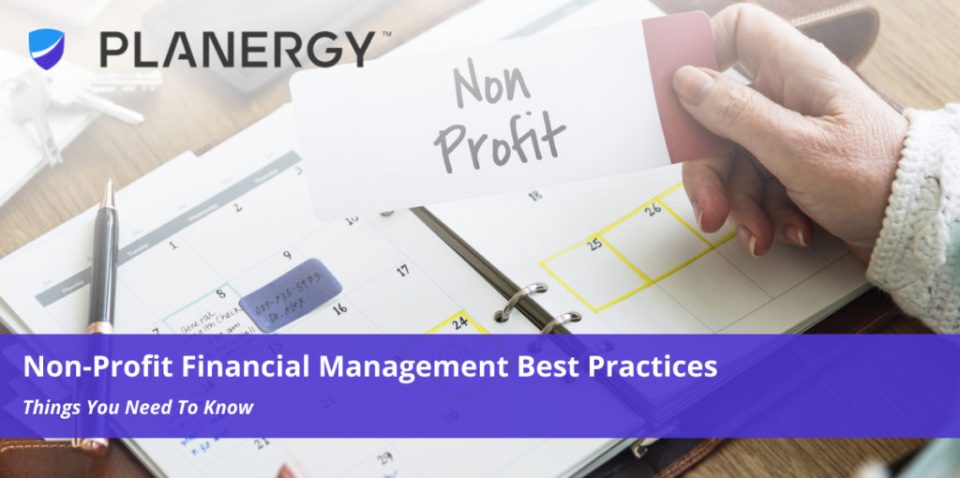Non-Profit Financial Management Best Practices
Financial management is important for all companies, big and small. It’s especially important for non-profit organizations because as the name suggests, absolutely no profit is allowed. If you end up with excess in your budget for the year, then you’re expected to spend it somewhere – be it through more programs aligned with your organization’s mission or employee bonuses.
Of course, no non-profit leader really wants to spend their time on financial management decisions and developing internal controls. But, it’s a necessary part of keeping things running smoothly. Without solid financial management, no organization will last long. Your nonprofit needs good internal controls to remain in compliance with all rules and regulations. But those internal controls also play another role — they help to fuel growth and stability, making it easier to support the organization’s mission.
When’s the last time you checked on your organization’s financial health? Follow these best practices as you determine where your nonprofit currently stands. Remain honest and objective throughout the assessment of needs and practices.
Leadership Staff Duties and Responsibilities
- Limit the number of people who can sign checks for the organization.
- Open a business bank account in the organization’s name rather than using personal accounts.
- Develop an internal accounting system, with checks and balances in place to ensure that no single staff member has full control over the finances.
- Accurately maintain income, expense, and transactions records throughout the year.
- Create annual budgets that give clear direction for all spending.
- Every quarter, prepare financial statements for the board of directors to review. Be sure the statements include a balance sheet, profit and loss statements and a comparison to the budget with a cash flow forecast.
- Every quarter, have the treasurer conduct an independent internal audit of all the critical financial records. This includes bank statements, investment statements, credit card statements, expense reports, and reconciliations.
- File all appropriate annual reports with the state and IRS. Nearly every charitable nonprofit that’s recognized as tax-exempt is required to file a Form 990, which is known as an annual report.
- Comply with a conflict of interest policy. Review and sign said policy.
- Develop a fundraising plan for the upcoming year.
Executive Committee/Board of Directors Duties and Responsibilities
- Be aware of all the people who can sign checks on the organization’s behalf.
- Be aware of all the banks and other financial institutions where nonprofit assets are located
- Know if the organization has borrowed money from any institution and the terms of the loan(s).
- Confirm that financial checks and balances are in place.
- Review and approve all compensation the executive director receives.
- Develop, maintain, and review a conflict of interest policy. Then review and sign said policy.
- Review financial reports on a monthly or quarterly basis.
- Approve the annual budgets.
- Review and confirm annual filings
- Review and discuss the independent financial audit
- Review all annual fundraising plans
- Fulfill their duties without payment, unless there’s a policy in place for out of pocket expenses eligible for reimbursement
- Review any and all insurance policies to ensure proper risk mitigation. Ensure those insurance policies are renewed.
- Develop the written policy that prohibits employees and their immediate family members from serving as treasure or anywhere on the board of directors.
- Manage the investments and reinvest assets when and where appropriate.
- Play a role in the procurement process by ensuring that you receive the best value for any goods and services the organization needs, using comparisons and an informed bidding process.
- Approve Executive Director expense reports.
- Establish the organization’s cash management policy. It should outline the acceptable level of operating reserves and a plan to establish the reserve fund. It should also include the process for withdrawing funds from those reserves.
- Disclose any and all related party transactions between board members and their families to the board of directors, the auditor, and the IRS.
- Regularly review organizational risks to ensure adequate understanding of all operational risks. Common risks include: relying on a single employee, vendor, event, funder, etc., risks associated with long-term contracts, liabilities with delivering programming, etc.
Even small nonprofits have to keep track of finances, no matter how little they bring in.
Activities in the Annual Accounting Cycle
Non profits have certain accounting tasks they have to take care of throughout the fiscal year, just like any other business. These include planning and cash management, financial statements, analysis, and reporting. Together all of this includes:
- Financial planning
- Budgeting and budget management
- Managing organizational finances and cash flow
- Handling credit and collections
- Conducting budget deviation analysis
All of this requires familiarity with a variety of financial statements such as the Statement of Activities (income statement) and Statement of Financial Position (balance sheet), concepts of financial analysis and reporting, and accounting ratios.
Nonprofit accounting is similar to corporate accounting. Each organization should follow the Generally Accepted Accounting Principles (GAAP).
Financial Policies Your Organization Should Have In Place
Reimbursement Policies
It’s highly likely that employees and maybe volunteers will have business expenses they pay out of pocket. To be reimbursed for those expenses, certain rules must be followed. To be reimbursable, the expenses must be reimbursed through an accountable plan. To be considered an accountable plan, the following must apply:
- Expenses must be related to the nonprofit organization
- The party seeking reimbursement must account for the expenses within 60 days of when it was incurred
- The party must return any excess reimbursement funds within 120 days of receipt.
These rules are in place to prevent misclassifying payments to people as reimbursements if they are actual compensation.
Gift Acceptance Policy
Gifts are nice, but there are some your organization just shouldn’t accept. Depending on the gift, it may create more of a hassle for your organization than a benefit. You should manage expectations for donors, employees, volunteers, and board members with a written gift acceptance policy.
When you file the required IRS Form 990, you’ll be asked if your organization has a gift acceptance policy, and if you say yes, you have to complete the Schedule M and report any non-cash contributions as well as gifts.
Why wouldn’t you want to accept a gift?
Certain gifts may expose your organization to legal liability or obligations you’re not ready to take on. For instance, if you receive a gift of real estate, you may find yourself dealing with issues regarding property taxes. If you receive a vehicle, you may have issues with licensing.
Conflict of Interest Policy
A conflict of interest policy requires anyone who does or may have a conflict to disclose that conflict. It also requires any board member with a conflict of interest to be excluded from voting on matters where there is a conflict.
Beyond this, the policy outlines how the board will manage conflicts. The IRS Form 990 asks about the policy and the process used to determine conflicting interests and how they are managed. Keep in mind that some states also govern what must be included in the policy.
Whistleblower Protection
Under federal law in the United States, companies, including nonprofit organizations are prohibited from retaliating against people who “blow the whistle” on an employer’s accounting and financial management practices. More than 45 states have laws in place to protect whistleblowers. Today, more nonprofits than ever are adopting whistleblower policies that encompass more than financial practices.
Operating your non-profit organization with financial best practices makes things easier for everyone involved. It will keep things simple for your bookkeeper and CPA, which will make tax filings move smoothly
,

